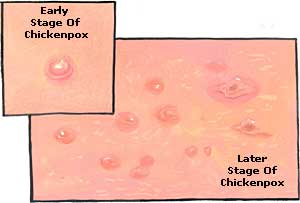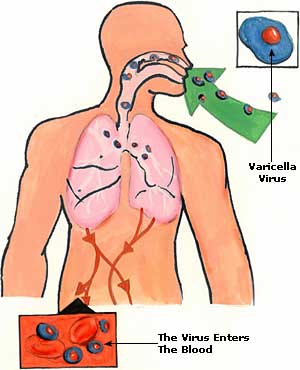Chicken Pox
Chickenpox, also known as varicella, is a highly contagious disease that largely affects children between five to ten years of age. Chickenpox occurs all over the world and is especially rampant between the months of March and May. Caused by the varicella-zoster virus, which is a member of the herpes family, chicken pox is a self-limited infection. Once infected with the disease, you have lifelong immunity against it. In some cases however, the body does not completely rid itself of the virus and it may manifest itself later on in the form of shingles. Shingles mainly affects adults and is characterized by a painful rash.

Symptoms of Chicken Pox
Chickenpox begins with symptoms that are common to most viral infections, such as fever, cold, headaches, body ache, and loss of appetite. A few days after these symptoms occur, you will notice a rash across the stomach, chest and back made up of red, flat dots. These red dots soon form clusters of pimple-like eruptions that turn into clear blisters and spread to the legs, hands, face, and scalp. Some people develop a few concentrated eruptions while others may have a virulent collection of rashes all over the body. New crops of pimples and blisters keep forming over the next three or four days and turn into dry scabs about a week after their first appearance. These scabs will finally dry up and fall off one to weeks later. Throughout the eruptions of rashes and blisters, there will be constant and extreme itchiness, which is one of the main problems associated with chicken pox.

The contagious period of chicken pox begins one to two days before the first few symptoms become apparent and continues until the rash dries up and scabs form. As a result it is very easy to contract chickenpox from someone else and the longer the exposure to an infected person, the more severe the infection. To sum up, chickenpox symptoms include:
- Fever
- Body ache and headache
- Fatigue and weakness
- Abdominal pain
- A red rash that starts on the chest and back and spreads all over
- The rash starts off as spots, turns into blisters and is extremely itchy
- The blisters are filled with a clear fluid that finally break and crust over to form scabs
- The disease is generally mild in children and more severe in adults
- Adults also take longer to recover from chickenpox and may suffer from other complications as a result of the disease
- The weaker the infected persons immune system, the more severe the effects of the disease
Chickenpox normally clears up within ten to fourteen days without any real medical intervention. However, call your doctor immediately in case any of the following symptoms are experienced:
- The fever lasts for more than four days and rises to 102° F or higher
- There is a cough along with difficulty in breathing
- The patient seems disoriented and confused
- He seems sleepy or has trouble waking up
- He cannot walk easily
- He complains of a headache or a stiff neck
- The rash is leaking pus or is swollen, red, and hot to the touch
- There is nausea and vomiting
Causes of Chicken Pox
The virus varicella-zoster is the cause of chickenpox. Also known as herpes virus 3, the disease is highly contagious and spreads through contact with the infected person, either directly via touch, or indirectly through clothing that has been in contact with the infected areas. The virus also spreads through airborne particles and can be breathed in. Since the period of contagion extends from two to three days before the symptoms appear up until the scabs fall off, there are several opportunities for the disease to spread and infect others. Special care has to be taken to quarantine the infected person especially from other members of his family. His clothes, towels, and other items of personal hygiene should be washed and kept separately as well.
Remedies for Chicken Pox
Chickenpox can generally be treated at home with only a small number of cases needing medical attention. Chickenpox treatment includes:
- Reducing a fever with over-the-counter medication such as ibuprofen or acetaminophen. Avoid giving children medications such as aspirin, as this has been associated with Reye Syndrome.
- Cool water baths with baking soda or oatmeal can help reduce itching and soothe the blisters. These baths can be taken every four hours during the day or whenever the itching gets too unbearable.
- Cold compresses applied to the affected areas can provide relief. Applying calamine lotion also helps, but avoid using lotions and creams that contain diphenhydramin as this can lead to toxicity. Burows solution is a commercially available powder that is to be mixed with water and applied to the rash to reduce itching and offer relief.
- Keep fingernails short and trimmed at all times to prevent scratching and infecting the blisters, thereby causing permanent scars. In case the blisters get infected, your doctor may prescribe a round of antibiotics.
- Keep children away from school until all the blisters dry up and scabs have fallen off. Even a visit to your doctor should be handled cautiously and you should inform your doctor that your child might have chickenpox so that the necessary steps are taken to prevent him from infecting other children waiting at the clinic.
- If blisters develop in the mouth, eating may be painful. In such cases, try drinking fluids with a straw and keep the food bland and soft. Cold foods such as milkshakes and ice cream are also recommended. Avoid foods that are oily, spicy or overly acidic.
- Doctors now recommend that all children between the ages of 12 to 15 months receive their first dose of the chickenpox vaccine and another booster shot when between four to six years of age. The chickenpox vaccine is a relatively new development and has proved nearly 70% effective in preventing future cases of chicken pox. In cases where the child has been vaccinated and still develops the disease, the symptoms are much milder and recovery significantly quicker. In case your child has already had chickenpox, there is no need for the vaccine.
- In severe cases of chickenpox where the patient might be in a high-risk group, there is a drug called acyclovir that is a cure for chickenpox in that it lessens the severity of the symptoms and the duration of the illness. However, this drug is very expensive and is only prescribed in a few necessary cases. It is also associated with side effects such as fatigue, headaches, diarrhea, vomiting, and joint pain.
- Home remedies for chickenpox include applying honey or vitamin E on the blisters to prevent scarring, having a lukewarm bath with neem leaves, and drinking herbal teas made of lemon balm, chamomile, basil, or marigold. These are all directed at providing relief from the incessant itching.
Diet for Chicken Pox
Since the symptoms of chickenpox include fever and fatigue along with the rashes and blisters, special care has to be taken when choosing an appropriate diet for chicken pox. At the same time, keep in mind that your diet does not have a direct influence on the development, progression or general outcome of the disease. Certain foods are advised simply to avoid undue stress on the digestive system, as you are most likely already afflicted with fatigue and weakness. The goal of a chickenpox diet is to boost the immune system of the patient and speed up the recovery process. To this effect, you should:
- Increase the intake of fresh fruit juices to keep the patient hydrated and to improve immunity
- Avoid processed and fatty junk food and consume large amounts of fresh vegetables and fruits
- Foods that are difficult to digest should be avoided such as red meat, spicy and fried foods
- Include foods high in vitamin A and C, zinc, magnesium, and calcium to boost immunity and increase stamina
Suggestions for Chicken Pox
Chickenpox is especially dangerous for women who are pregnant. Contracting chickenpox during the first 20 weeks of pregnancy can lead to a higher risk of birth defects in the fetus and other health complications for the mother. Keeping this in mind, it is important to stay away from people infected with the disease during a pregnancy. In case the woman contracts shingles during her pregnancy however, there are no associated risks to the fetus. In case a pregnant woman or other people who fall into the high-risk category (such as leukemia patients or patients with immune deficiencies) do contract chickenpox, they may be given the chickenpox vaccine to lessen symptoms and reduce the chances of further health complications.
References
- Janice C. Hallal, Understanding herpes zoster and relieving its discomfort, Geriatric Nursing, Volume 6, Issue 2, MarchApril 1985, Pages 74-78, ISSN 0197-4572, 10.1016/S0197-4572(85)80003-3.
- Cures for chicken pox scars: it has been a year and my chiken pox scars have not dissapeared , ways to get rid of chiken pox scars ???
Chicken pox is an infection that comes out on the face and other parts of the body as sores.... - Question on honey and chicken pox: how long does the honey stay on the skin as a remedy for chicken pox?
Honey is a natural sweet substance produced by honey bees. It cleanses and heals wounds.Topical... - Health advice on cream for chicken pox cure: is gold bond a good cream to put on your skin to help cure the chicken pox
I wouldn't want to comment on commercially available creams when we have natural and...
Chickenpox is a very infectious disease. Drink plenty of fluids to keep the body hydrated and sponge with tepid water if the fever is high. Application of Aloe Vera gel soothes itching on the skin and also promotes healing of the blisters.
On the island the best remedy is to boil alot of sage leaves in a big pot and give the child/adult a bath in it everyday. It heals the skin quickly.
When your child has chicken pox DON'T bathe them. When my daughter had it and my nephew she recovered quickly whereas my nephew where given baths and lotion took alot longer to heal and had alot more visible scars. It only takes 2-3 days without bath and heals faster and less spots occur. Just keep the little body from getting wet!
Of course! Chicken pox prevents your child from attending the school. But you are the only one to safeguard your child. Some simple steps to avoid chickenpox boils are: 1.Avoid contact with infected patients. 2. Cleanse your house with dettol lotion daily when an infected person is staying in your house. 3. Inject prescribed vaccinations to prevent the deadly disease. 4. In case if you are infected, do not scratch your skin as the liquid may squeeze out and affect the nearby person.